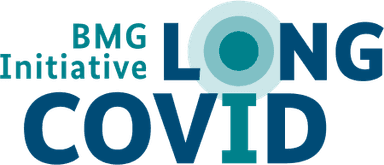Note: The following text is a guest article. They reflect the personal views of the author. The article is not an expression of opinion by the Federal Ministry of Health.
Guest article: Karin Maag
Providing faster and better care
The Federal Joint Committee (G-BA) is planning to adopt regulations on structured healthcare treatment courses for post-infectious syndromes such as Long COVID in Decem-ber 2023. Karin Maag, a bias-free member of the G-BA, explains the current status of the deliberations.
Published on: 09/07/2023

© Copyright Rosa Reibke/G-BA
What is our mission
Patients with suspected post-infectious syndromes such as Long COVID must receive better and prompter care - throughout Germany and irrespective of which statutory health insurance fund they are insured with. Accordingly, the legislator has commissioned the G-BA as the highest decision-making body of the joint self-administration to determine binding treatment courses for all insured persons suspected of having Long COVID.
The legislator gave the G-BA the guideline that it should ensure "coordinated and structured health care across professional groups". The G-BA could make regulations that ensure "interdisciplinary and standardised diagnostics" and timely access to a "multimodal therapy offer". We are pleased that our suggestion was followed in the legislative process that we can also offer the new guideline to insured persons who are not suspected of having Long COVID - but who have a disease with a similar causes or symptoms, such as Myalgic Encephalomyelitis/Chronic Fatigue Syndrome (ME/CFS). There is also a lack of the necessary comprehensive interdisciplinary and standardised diagnostics and timely access to a multimodal therapy service for such patients. The legal mandate of the G-BA is anchored in § 92 para. 6c of the German Social Code, Book V (SGB V).
What challenges do we face?
We are delighted that this mandate has been given to the Federal Joint Committee, because we also see how pressing the need is for targeted, multimodal therapies for those affected. At the same time, we have already highlighted in the legislative process that there are no reliable markers or examination results for the diagnosis of post-infectious syndromes such as Long COVID. There are also no causal therapies and high-quality medical guidelines. Unfortunately, not much has changed yet in the meagre amount of scientific know-how, even though research efforts have significantly increased. The Innovation Fund at the G-BA is therefore providing 20 million euros for the BMG's "Research Emphasis on Long COVID".
Despite the scarce knowledge - or precisely because of it - the need for structured health care treatment courses is significant. However, it seems that the current state of knowledge is not only tricky for those affected. It naturally also poses challenges for the G-BA, which is supposed to develop recommendations for a structured and evidence-based approach - from diagnosis to the various stages of treatment.
How are things progressing?
Given the fact that there is currently a lack of knowledge concerning a reliable diagnosis and a good therapy, the G-BA has decided to implement the legal mandate step by step. The first step is primarily to describe specific requirements for the existing levels of care, not only for adults, but also for children and adolescents, depending on the type, severity and complexity of the disease: primary care and paediatric care, specialist care and specialised outpatient care. For example, the tasks of the service providers involved are outlined. We have placed special emphasis on a coordinated and structured cooperation of these participating leading providers: Patients are to be guided along largely uniform treatment courses to the appropriate contact persons much more quickly. The aim here is also to speed up diagnosis, which will then facilitate the appropriate therapy.
We are well on track with our consultations and will in all likelihood be able to initiate the commenting procedure on the draft guideline in September. In addition to the funding agencies and patient organisations represented in the G-BA, professional societies and associations will also be given the opportunity to comment on the planned regulations. After evaluation of the written comments and an oral hearing, we will then probably adopt the new guideline on schedule in December 2023.
However, in view of the fact that the scientific knowledge base will presumably soon have improved, it is already evident that the G-BA will continue to develop these regulations. Only regulations that correspond to the state of medical knowledge can serve as an aid to doctors and contribute to really improving the treatment of young and adult patients. This is the standard which we demand of our guideline.
Vita
Karin Maag has been a bias-free member of the Federal Joint Committee (G-BA) since July 2021 and chairwoman of the subcommittee that prepares the implementation of the legal mandate on Long COVID. However, the general question of ensuring medical care services through good structures and processes was already on her mind when she held her previous position: She was a fully qualified lawyer and a member of the German parliament for twelve years, and from the year 2017 she was the health policy spokesperson of the CDU/CSU parliamentary group in the German parliament. Ms Maag gathered experience in local and state politics previously, among other things, as Ministerial Director of the State Parliament of Baden-Württemberg and as Head of the Lord Mayor's Office of the state capital Stuttgart.
